

With the game well in hand, I braced myself for the final remaining turns before achieving victory. That looked to be the default Spaceship in this game, as I wasn't going for Culture or a military victory, and I didn't know enough about the new Diplomatic victory setup to have a clear path via that route. It seems to be a bit harder than simply buying up all the city states now, which feels like a good thing, although I'm not too keen about relying on votes from the confusing and unpredictable Civ5 AIs. I had little fear than any of the AIs would be able to win a victory before I could finish the tech tree and launch a spaceship. Unfortunately, this meant that the remaining turns were turning into a major slog. I had to force myself to keep playing, which was never a good sign.
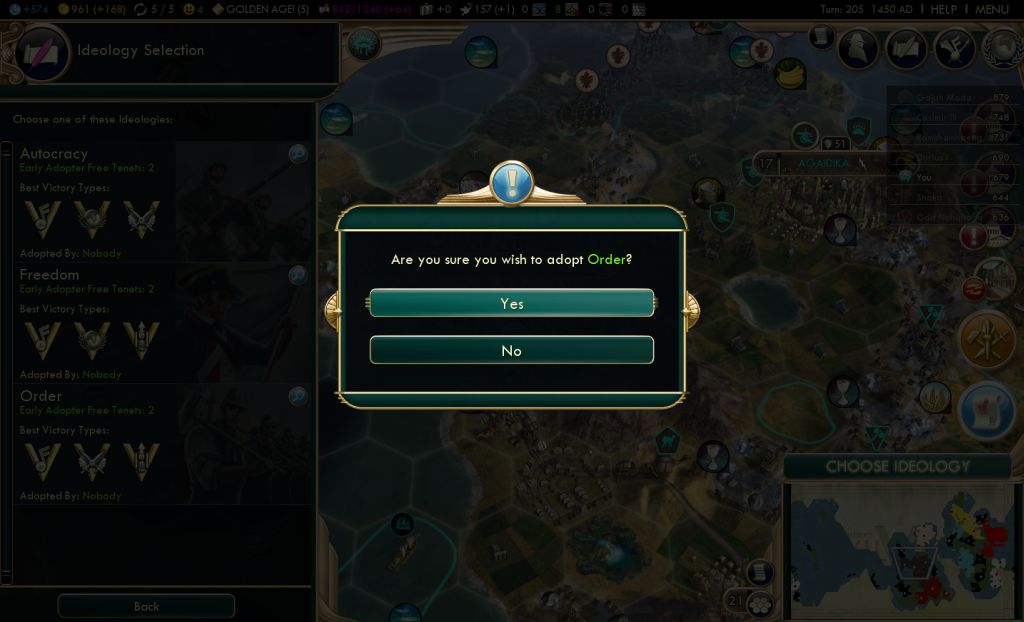
Here was something new. When we reached some unknown date in the Industrial period (I think it was half the leaders reaching that era on the tech tree, something like that), I was asked to pick an ideology from this list. The choices are Freedom, Order, or Autocracy, each of which was a social policy tree in the older versions of Civ5. In practice, this means picking out certain benefits from a list of different choices, and having the option to take more policies in an ideology when the cultural meter fills up, instead of taking a policy from the standard trees. I went with Order, as that seemed to have the more useful stuff by far. Freedom leans towards Cultural victories, and Autocracy only seems useful for military stuff. I grabbed Hero of the People (+25% faster Great Person generation) and Skyscrapers (33% cheaper rush buy purchases) from a list of seven different choices.
This is all well and good, I suppose, but it feels redundant. Ideologies are yet another gameplay mechanic that mimics the same thing. Social policies have you choosing certain benefits from a list, and religion has you choosing benefits from a list, and now ideologies have you choosing benefits from a list. It's sloppy game design to have all these different systems working in almost exactly the same way. This is typical expansion fare for the Civilization series: extra fluff that doesn't particularly need to exist. More stuff simply for the purposes of putting more bullet points on the back of the box. And let's be clear, Civ5 is hardly the only game that does this, as I've written about with Civ4's poorly implemented corporations and overseas colonies, and even as far back as the Civ3 expansions from a decade ago. That said, this is something that probably should have been left out of the game. Ideologies don't add much of anything to the game that wasn't already covered by social policies.
You get the first two ideology policies (tenents, I think they're called) for free, and after that you can choose more of them when the culture meter fills up. Either tenets or normal policies, one or the other. When I had my next pick, I continued filling out the Rationalism tree with the Scientific Revolution policy:

This one grants 50% more beakers from research agreements. I already had the Porcelain Tower wonder, which does the same thing, so I would be getting the maximum 100% bonus on any completed research agreement. I signed a couple of these earlier with the AIs, and the first round had already completed, each one seeming to be worth a little more than a free tech. Research agreements are another mechanic that have been around since the release of Civ5, and they've gone through a ton of different iterations over the various different patch cycles. They have also been one of the most broken aspects of this game, with various different abuses of the research agreement mechanics allowing expert players to slingshot their way through half or more of the tree. I confess that I don't know the current mechanics; I searched around a bit on CivFanatics, but most of what I could find was from outdated earlier patches. It seems as though they have been tuned down quite a bit in Brave New World. (Although there's an obscure bug / exploit that allows players to get hundreds of thousands of beakers for free with research agreements and COMPLETELY break the game. This has not been patched and appears as though it will never be fixed. EDIT: Of course, two days after I wrote this, that new patch appeared out of the blue and fixed this issue. Kudos, Firaxis!  )
)
My issues with research agreements are twofold: they are both unreliable and uninteresting. They're unreliable because a research agreement requires both parties to remain at peace for the full 30 turn duration of the deal, and that has historically been a tough sell with the unpredictable Civ5 AIs. You can pay money for the research agreement and wind up with nothing when the stupid AI declares war 29 turns later for completely unrelated reasons. Like so many of the mechanics in Civ5, this one leans too heavily on random chance for my taste. Secondly, there's just nothing interesting about the research agreements. You sign then, wait 30 turns, and then X amount of beakers magically appear and get applied towards a tech. It's such a passive gameplay system, you're not doing anything other than sitting around hoping the AI doesn't break the deal. At least the old wheeling and dealing tech trading approach was a more active system. It doesn't help either that for most of Civ5's history the research agreements have been incredibly overpowered, to the point where expert players were feeding gold to backwards AIs just to provide them with cash to sign a research agreement, the player effectively paying BOTH sides of the deal to make it happen! This is part of the reason why research agreements are inherently difficult to balance properly. Too weak in beaker output, and the uncertainty involved makes them worthless. Too strong, and players are just exploiting the AI to pull tens of thousands of free beakers from the ether.
I signed them in this game, of course. Why not? There was little else to do with my gold. My personal thought is that research agreements should not exist in future iterations of the Civ series. The system is unintuitive, too prone to exploits, and just plain boring.
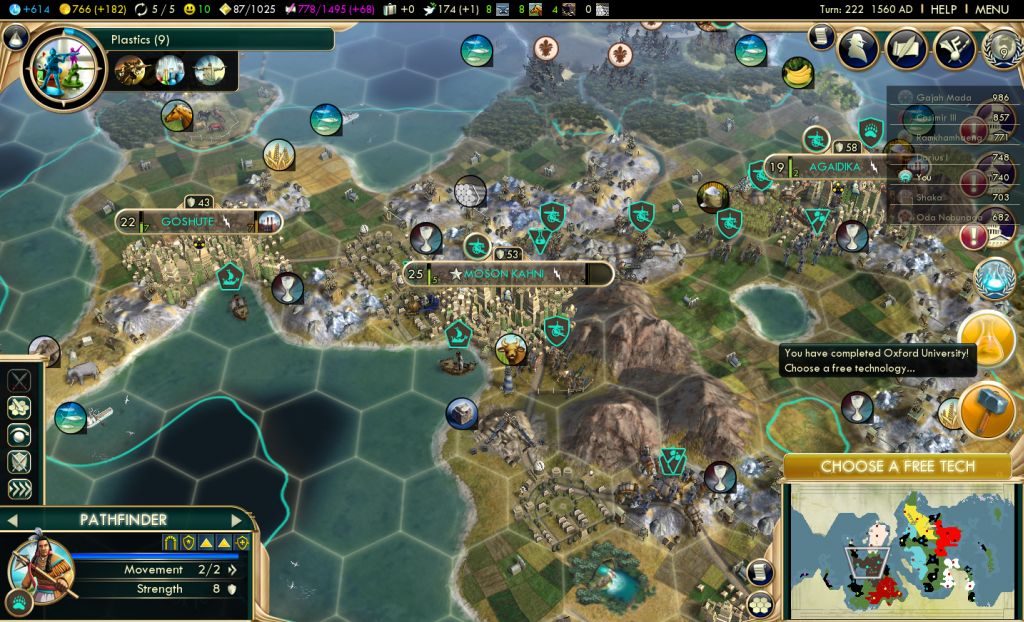
Turns kept on crawling by with little of interest to report. I pushed towards Plastics tech for Research Labs, and actually slingshotted it using Oxford University. I think this was a mistake though, I should have built Oxford for a much earlier free tech; Scientific Theory probably would have been a good choice. In any case, now my gold went into rush-buying research labs in the weaker production cities, which quickly shot up the beaker count close to 900 per turn. Yep, the research labs increased overall science by about 50% for the whole civ. The techs that unlock new research buildings are huge breaking points in Civ5, and therefore enormously valuable targets on the tech tree. Go after them ASAP.
Presently I finished researching Archaeology tech, which caused a series of Antiquity Sites to pop up on the map. I had no idea how this mechanic worked, so I built an Archaeologist unit and moved him over to investigate one of the spots. After five turns of digging, I received this notification:

I lost the mine on that hill tile, and I had the option of replacing it with one of these choices. I could take the artifact back to Te-Moak and use it in a Great Work of Art slot (producing 2 culture and 2 tourism per turn), or I could use it to create a Landmark on that tile, which produces 5 culture/turn when the tile is worked. I had no idea what Tourism did, so I went with the second option that produced more culture. From this point further, that hill tile had a landmark on it, just as if I'd used a Great Artist on the tile.
I guess this is a nice little feature to add, and I can see how some players would enjoy... no, enough beating around the bush with false politeness. Do you know what this is? This whole archaeologist mechanic is pure fluff. It adds nothing to the game other than busywork. The only reason why this stuff exists is to make up for the fact that Civ5's lategame is dreadfully dull, and the designers had to invent extra tasks to occupy the player's time. Think about it this way: is this *REALLY* what Civilization's gameplay should be about? I should be focusing on building a great empire, or conducting diplomacy with high stakes, or fighting wars against powerful opponents. This idea that I should be moving an archaeologist unit around the map - an ARCHAEOLOGIST! - to dig in ancient ruins strikes me as absurd. This is something that belongs in an entirely different genre of game. It has more in common with a fetch quest in a role-playing game than it does in a strategy game. What in the world is going on here? This is the worst kind of feature bloat that creeps into expansions. Ugh. 
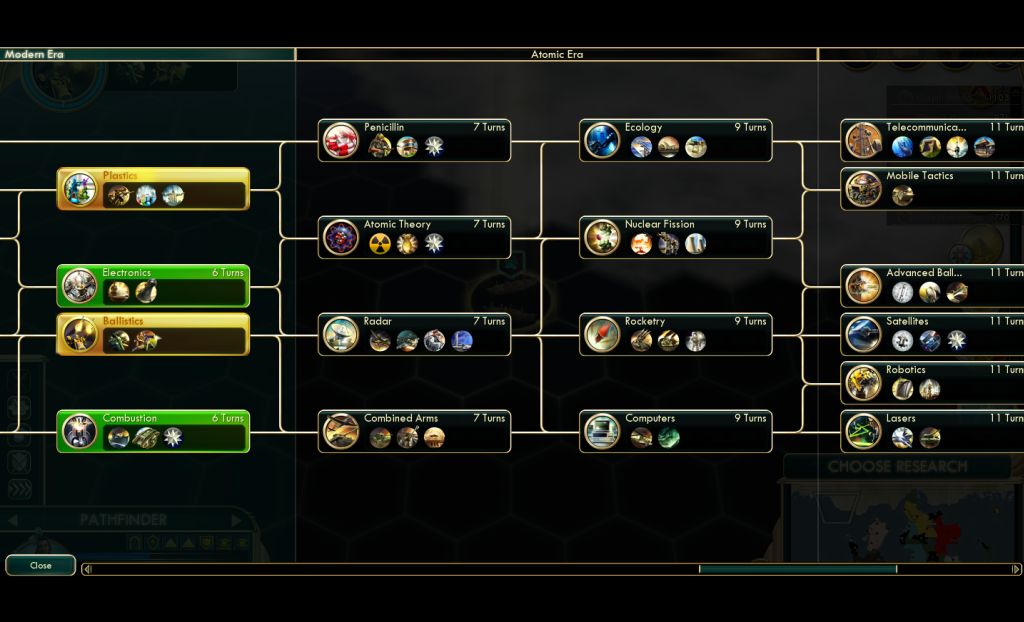
You've got to be kidding me. After the Modern Age comes the Atomic Age, and the after that comes the Information Age. Dear Lord, that tech tree goes on forever! One of the understated things about the Civ5 expansions was the sheer number of extra techs added to the game. There were 72 techs in the original version's tech tree, and the expansions added seven more, for a total of 79 techs. That might not sound like a lot, but the expansions also significantly increased the beaker cost of those techs compared to the release version of Civ5, dragging the game out significantly. All of the extra Information Age techs are like adding an entirely new era to the tech tree. Unfortunately these extra techs don't add much to the game, with the new content mostly consisting of even more lategame units to build, which will rarely have much impact due to appearing so late on the tree. Mostly these extra techs just drag out the game for a longer period of time, forcing your civ to research more techs to get to the finish line. There's very little going on this late in the game: no tile improvements left to add, nothing to do with workers, no point in founding more cities or going to war due to the research penalty. It's just... boring. Contrary to what advertising would like everyone to believe, adding more stuff to a game doesn't necessarily make it better. I see little point to dragging out the endgame with additional techs.
A little later, I had the culture to take the final Rationalism policy and complete the tree:

Free Thought provides extra science from universities (taking them from 33% bonus up to 50% bonus) and extra beakers on trading posts, which doesn't really matter because trading posts have been heavily nerfed from the old release version of Civ5 and are almost never worth building. I skipped over the previous Rationalism policy: Humanism produces Great Scientists 25% faster, similar to that Order tenet that I'd taken at about the same time. Of course the real prize was finishing the Rationalism tree itself, which grants your civilization a free technology. I used it to take Satellites, which instantly catapulted my civ into the Information Age.
This caused the full United Nations to meet for the first time, in which the host civ receives 6 votes, other civs receive 4 votes, and each city state receives 2 votes. With the leaders controlling so many votes between them, it looks to be pretty tough to win a Diplomatic victory now. I was able to win the election and become the host, but only because I controlled more city states than anyone else. I still don't get why the World Congress / United Nations uses such a convoluted voting system. Why not simply vote by population? It works beautifully in Master of Orion, and maybe it would even create an incentive for players to declare war on rival civs to reduce their population. Again, a promising idea here, but the actual implementation is confusing.
Something else was increasingly a concern in these long, grinding turns: my empire seemed to be gaining more and more unhappiness. I could not figure this one out. I had copies of just about every luxury resource on the map, alliances with city states all over the world, and still my global happiness counter kept dropping. I even had the Fountain of Youth providing that giant +10 happiness bonus! First the happiness counter fell below zero, and then it fell below negative ten, where all city growth ceased completely. What was I missing? Finally I found the problem:
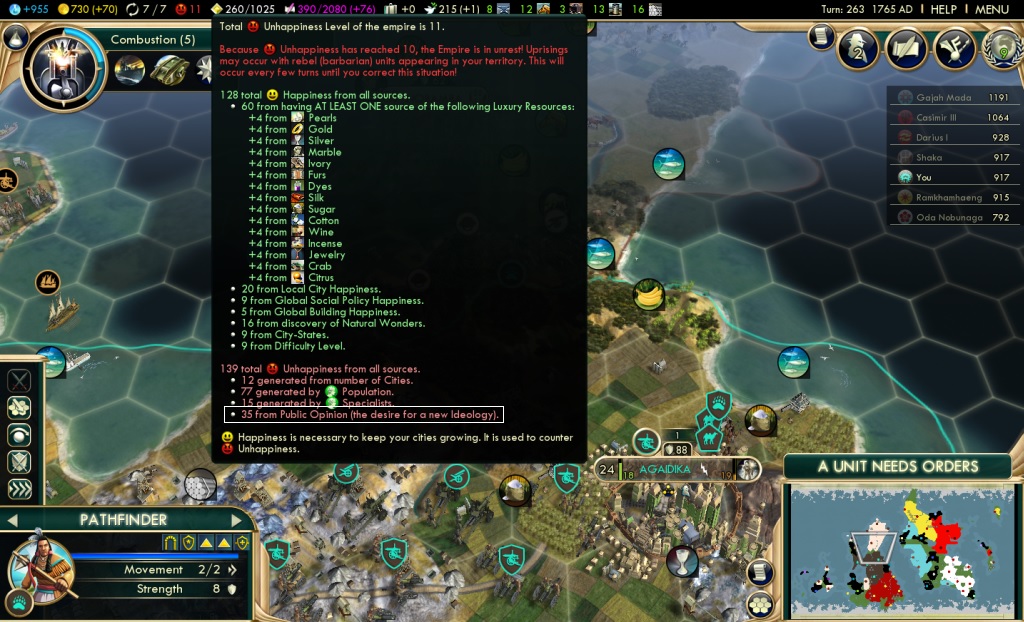
I had a full 35 unhappiness from people disliking my Order ideology. That was an awful lot! Apparently every other leader in the game choose either Autocracy or Freedom, and since I was the only one with Order, everyone disliked me for it. This was also tanking my relations with everyone else diplomatically, not that I had any clue what was going on at first. I thought that maybe these leaders were all predisposed to take the other Ideologies and I was simply ignorant of how this system worked, but no, apparently Order is the most popular Ideology for AIs to adopt in Brave New World. It seems that I just kind of fell into this by a fluke of bad luck, everyone else adopting different Ideologies and making mine the global pariah.
I was forced to convert to Freedom Ideology, giving up both of my Order tenets and having to eat two turns of Anarchy in the process. Yikes, that's a harsh penalty!  I understand that this was a rare event which won't happen much, but it still felt ridiculously punishing. I had no way of knowing what Ideology the other AIs were going to pick when I was first prompted to take one. (And you can't turn the choice down, you must pick an Ideology no matter what.) This was just a random shot in the dark where everyone picked something different, and then hated me for it. It reminded me of the Civ4 religious system, where rival faiths would dislike one another, but in the Civ4 system you were never left wondering where the AIs would stand, or be forced to take a religion if you didn't want one. This whole Ideology mechanic is another idea that has decent potential, but needs more fine tuning and revision to avoid this kind of "gotcha!" moment. It's another classic Civ5 case of good intentions, flawed implementation.
I understand that this was a rare event which won't happen much, but it still felt ridiculously punishing. I had no way of knowing what Ideology the other AIs were going to pick when I was first prompted to take one. (And you can't turn the choice down, you must pick an Ideology no matter what.) This was just a random shot in the dark where everyone picked something different, and then hated me for it. It reminded me of the Civ4 religious system, where rival faiths would dislike one another, but in the Civ4 system you were never left wondering where the AIs would stand, or be forced to take a religion if you didn't want one. This whole Ideology mechanic is another idea that has decent potential, but needs more fine tuning and revision to avoid this kind of "gotcha!" moment. It's another classic Civ5 case of good intentions, flawed implementation.

Every time there was a world leader election in the United Nations, all of the civs voted for themselves. It was not like the Master of Orion / Civ3 / Civ4 system where only the top two leaders were nominated. This pretty much ensured that no one could ever win the Diplomatic victory. I counted up all of the city states, and realized that I would need to ally with 14 out of the 15 city states to take the victory. With the amount of cash that the AIs were throwing around in the lategame, that wasn't going to happen. So.... I mean, this is better than the laughably easy Diplo win condition in the release version, where it was trivial to buy up all the city states and win the election. That doesn't mean that this is in good shape though. Why do I get the feeling that the new United Nations is another feature that wasn't properly tested and balanced? (I personally did much of the work on the Civ4 United Nations, which is why this has always been a particular interest for me.)
I finished the Hubble Space Telescope on Turn 276, and the Apollo Program on Turn 278. This began the process of burning through my saved up Great Scientists on tech lightbulbs, each of which went for a little over 8000 beakers. Unfortunately I'd only managed to accumulate four of them, no thanks to that stupid World Congress resolution that slowed the generation of Great Scientists, and the ridiculous Ideology nonsense that denied me the Order tenet to increase Great Person generation. This still left me about five techs short of what I needed to finish the spaceship, which meant more incredibly boring turns waiting out the slow process of researching the techs. Every turn meant waiting for all of the AIs to process their movement and production phases, and then dealing with all sorts of diplomatic nonsense that doesn't matter but takes up time. (The AIs just love to pop up constantly with denunciations and random trade stuff. This happens all the time in the lategame.) Then there's the notification spam on the right side of the screen, typically half a dozen messages popping up each turn. Nearly all of them are completely useless, but you never know when something important might be in there. Gotta read 'em all to be safe. Lots and lots of stuff going on, nothing of importance or interest to the outcome of the game. These turns just CRAWLED by. 
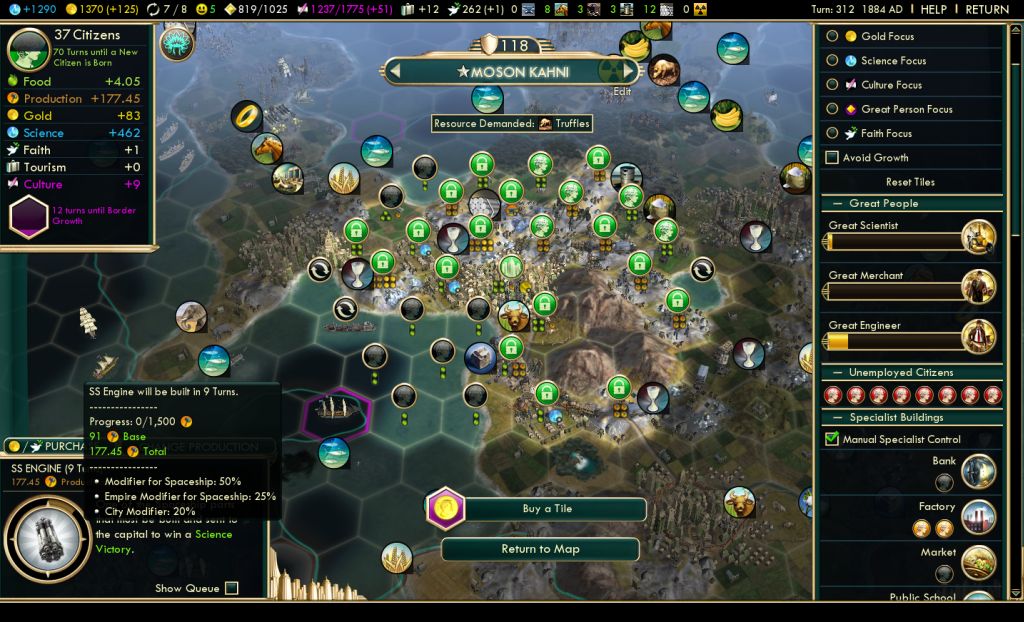
Even after I had the spaceship techs, I still had to build the spaceship parts themselves. Those things are not cheap at all! Even with the Hubble Space Telescope and spaceship factories and such, the parts were still taking almost a dozen turns apiece to finish. Are they supposed to be that expensive? Maybe I was missing something here. The net effect was just to keep dragging things out even further. Please, just let the game be over.
Then finally, eventually, it was:
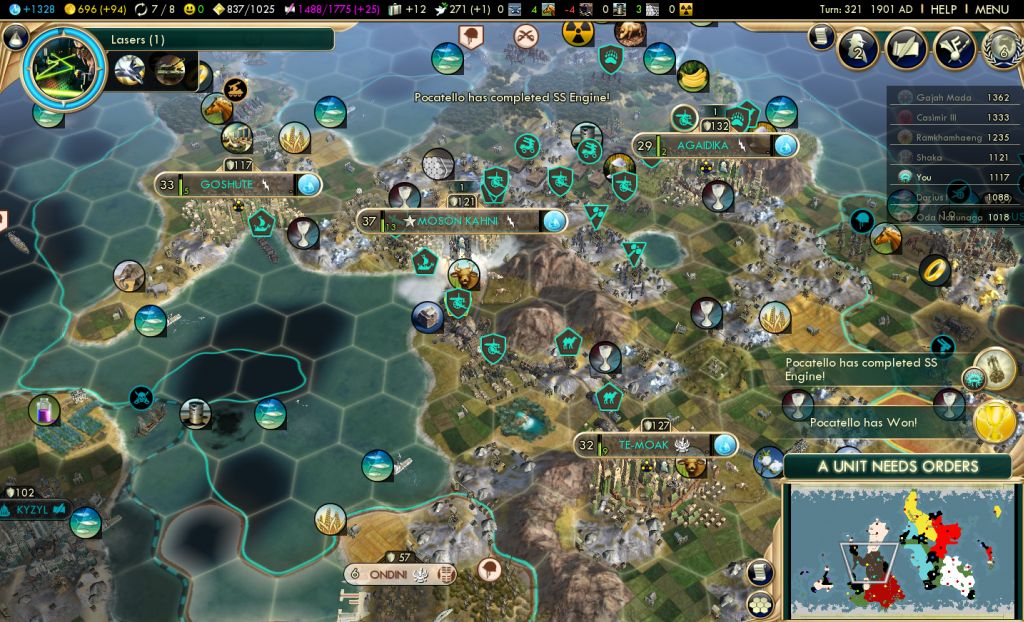
A nondescript Spaceship victory on Turn 321. I'd been hoping that I could finish before Turn 300, but it was not to be. There were a whole bunch of things that I could have done to finish faster. I could have accelerated my early game faster by having access to more city states and trading partners at an earlier date. I could have gotten more out of religion, which provided nothing other than the pantheon belief of Fertility Rites. (It was unfortunate that there were no Religious city states on my continent to help provide easy faith, and that I lacked terrain to abuse Desert Folklore.) I wasted a ton of gold having to buy/upgrade units due to insane warmonger Shaka being next door, and I had to bribe him into wars to distract him, all slowing me down. I could have signed more research agreements, as I underestimated how many endgame techs would be necessary to complete the tree. I easily could have picked up four or five more research agreements, I didn't sign them because I thought the game would be over before the 30 turns would pass! I also had little clue what I was doing in the Civ5 lategame, having never played more than 150 turns on my previous test games, and it definitely showed here. I didn't know the optimal path through the tech tree, I probably didn't build things in the best order in my cities, I didn't understand that you're supposed to use your extra spies to incite revolts in city states, and a million other tiny details that come from repetition. I also got horribly tripped up by the Ideologies in this game, forcing those two turns of Anarchy and wasting my Order tenets. Great Scientist generation was slower than it should have been for the whole game, no thanks to that silly World Congress resolution.
Finally, to be perfectly honest, I wasn't paying that much attention in the final 50 to 100 turns. There simply wasn't much going on. No new cities to found, no point in fighting wars, no interesting decisions to make. Adding those extra techs in the expansions was a major mistake, as they bloat out the endgame with more tedious filler. Having to go through seven extra techs to launch the spaceship was not fun at all. Now all of the Civilization games tend to suffer from boring endgames, since the outcome is nearly always decided in earlier eras. This is not a new problem. However, I can't recall ever being quite this bored in the past, and especially not on the very first playthrough. This was the first time I had ever reached the end of the tree in Brave New World; it should have been interesting based on sheer discovery factor. For me at least, it was not. As I've written several times about this sample game, I think that the early turns in Civ5 work well overall, and they provide a series of compelling competing priorities. But the Civ5 lategame is the exact opposite, a stagnant mess with nothing taking place aside from endless notification spam, all of it pointless. After roughly Turn 150 or so, Civ5's gameplay comes to a crashing halt. And it's easy to see why: cities are all planted by that point, workers have mostly finished adding tile improvements, resource sales and caravans have been established, etc. There's very little to do afterwards. Set the game on autopilot until achieving victory. All of the excitement and tension of the early game goes away, and nothing takes its place.

After achieving victory, there's still the same static picture as before, in my case an image of the spaceship. I'm a bit surprised that none of the expansions ever added short videos for the wonders or victories, it's the kind of small detail that fans always seem to like. There are some much welcomed additions, however, in the form of an endgame replay and these endgame charts. Very nice!  Should have been in the game on release, but glad they were finally added. The charts in particular have lots of great information. I've highlighted the lopsided science graph above, none of the AIs were even remotely close. (I see this as a major problem: say what you will about the stupid AIs in past Civ games, but they would definitely out-research your civ on the top difficulties. If the AI gets crushed this badly in science on Immortal... where's the challenge? I was dozens of techs ahead of every AI by the finish. Not a good sign.) This also raises another question: why aren't these graphs available at all times while playing? The game is clearly tracking this information behind the scenes. The player shouldn't have to wait until the game is over before seeing this information. Adding these graphs to the default Demographics screen would make the game a lot more interesting, and it should be trivially easy to do since Civ5 is recording this information anyway. Would be nice.
Should have been in the game on release, but glad they were finally added. The charts in particular have lots of great information. I've highlighted the lopsided science graph above, none of the AIs were even remotely close. (I see this as a major problem: say what you will about the stupid AIs in past Civ games, but they would definitely out-research your civ on the top difficulties. If the AI gets crushed this badly in science on Immortal... where's the challenge? I was dozens of techs ahead of every AI by the finish. Not a good sign.) This also raises another question: why aren't these graphs available at all times while playing? The game is clearly tracking this information behind the scenes. The player shouldn't have to wait until the game is over before seeing this information. Adding these graphs to the default Demographics screen would make the game a lot more interesting, and it should be trivially easy to do since Civ5 is recording this information anyway. Would be nice.
So there you have my sample game. I'm sure that true Civ5 experts could pick this apart and point out a number of mistakes that I made, and produce a superior result from the same map. I'm not going to pretend that I know this game inside and out, since I haven't spent that much time with it. However, I do believe that this serves as a solid representation of a standard Civ5 game on high difficulty. These are the general strategies that the top players will be using. They'll likely be executing them better than I've done here, but they won't be doing anything substantially different. Generally speaking, most peaceful games of Civ5 will look very similar to what I've done here.
With that long detour out of the way, now we can proceed on to the actual Brave New World review itself.



